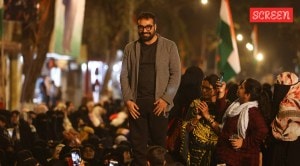Checking terror tap: India open to US, UK inputs
India is ready to move beyond its offer to jointly patrol the Line of Control with Pakistan, by proposing a ‘‘verification mechani...

India is ready to move beyond its offer to jointly patrol the Line of Control with Pakistan, by proposing a ‘‘verification mechanism’’ that shares intelligence on infiltration with the US and Britain.
Sources were quick to make it clear that this does not mean an ‘‘international presence’’ on the LoC at all but was limited to the sharing of information.
|
Musharraf to visit UAE
|
|
|
• Musharraf to visit Saudi Arabia, UAE next week. |
This new move could well constitute the centrepiece of New Delhi’s strategy that will be unveiled in talks tomorrow with US Deputy Secretary of State Richard Armitage, when he arrives bearing assurances from General Musharraf’s Islamabad that cross-border infiltration has been stopped.
Meanwhile, Armitage in Islamabad underlined Principal Secretary Brajesh Mishra’s statements in Moscow today, that India would not accept the patrolling of the LoC by international troops. In reply to a question, Armitage said, the same had already ‘‘been dismissed’’ by India adding that he was discussing ‘‘monitoring mechanisms without any prejudices.’’
‘‘The terrain in Kashmir is very difficult. Only the Indians and Pakistanis know every inch of it,’’ Mishra had said.
Meanwhile, with Armitage still in Islamabad, Pakistani information minister Nisar Memon made a surprising turnaround on the Indian proposal for joint patrolling the LoC, saying that it was a ‘‘serious’’ one and could be discussed if New Delhi presented it formally.
In fact, New Delhi could deal yet another ace during the Armitage visit, by proposing some diplomatic deescalatory steps in return for the US envoy’s assurances that Pakistan had ended cross-border infiltration and intended to keep its promises.
Amongst the steps on offer are, an end to the ban on overflying India, the return of India’s high commissioner to Islamabad as well as reopening train and air links to Pakistan.
None of these measures is, however, likely to be announced publicly, the argument here being that Musharraf must first be seen to have ‘‘permanently ended’’ infiltration across the LoC.
There seems to be some difference of opinion within the government whether New Delhi should agree to a US-brokered time-table with Pakistan, that is whether an end to infiltration can to be tied to deescalation.
The hardline view is that India’s de-escalatory measures should only come after the joint verification mechanism of the LoC is well in place. That is, after New Delhi, reconciles information and intelligence provided by the US and UK, and then comes to some sort of a joint conclusion on infiltration.
The view that seems to have emerged tonight after PM Vajpayee met his key ministers is that New Delhi should not be seen to be unreasonable, especially since the government’s gambit on getting the diplomatic community on its side on an end to Pakistan-sponsored infiltration, seems to have paid off so far.
Back in Islamabad, Armitage said he was ‘‘very heartened’’ to hear from Musharraf, after two hours of talks, that he would do everything to avoid a war with India. ‘‘We were able to discuss with the President his concept of cessation of activities across the LoC…We are looking for that to hold over in the long run,’’ he said.
But asked about his assessment of the situation, he said ‘‘of course it is quite complicated and volatile.’’ Musharraf made it ‘‘very clear to me that he wants to do everything what he can to avoid war. I think that is a very good basis on which we proceed,’’ he said.
‘‘I think that is same case with India. We need to do our best to bring down the temperature. President Bush and Secretary powell were very keen on having the US play its part,’’ he said.
Photos


- 01
- 02
- 03
- 04
- 05





























